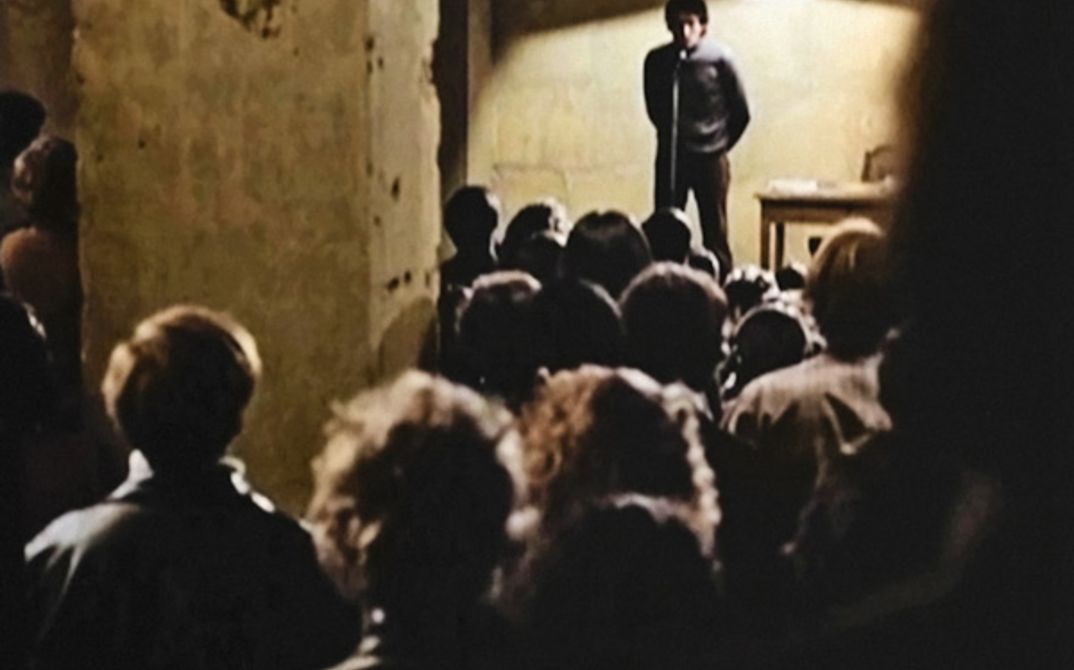Download Catalogue (PDF)
“Je proclame la destruction!” “Je proclame la destruction!” “Je proclame la destruction!” “Je proclame la destruction!” “Je proclame la destruction!” “Je proclame la destruction!” “Je proclame la destruction!” “Je proclame la destruction!” “Je proclame la destruction!” “Je proclame la destruction!”
One scene, dissected into two shots. In seemingly endless repetition we see the same thing over and over: a middle-aged man walks up to a podium. In front of him in rear view, a group of mostly young people. Behind the man a table and a chair, as if a lecture had just finished. It seems to be in a basement vault, or in a factory hall at least. The situation has a conspiratorial quality, the audience seems like students. Countershot to a closeup of three faces. A young man wants to move up closer, next to him is another young man, a woman – the only one it seems – is just behind him. Then the man walks up to the podium once again, goes to the microphone again, speaks his sentence. The crowd cheers, roaring with approval, cut to the closeup of the young man. “I declare the destruction,” says the man at the podium – not in rage, not screaming, just assertively and quite clearly. What he wants to destroy is withheld from the audience, since we find ourselves in an endless loop of waiting, declaring, and verbally articulated approval. It all lasts exactly 18 seconds. Arthur Tuoto puts this into his film ten times, so that the end would be reached after three-and-a-half minutes. But the film starts all over agin, it becomes timeless, endless, imperative. The mantra, perhaps a bit anarchistic, starts up again; timelessness and endlessness are completely suspended in its presentational form. We can’t even match up the two shots, Tuoto has cleverly pulled the applause form the first shot into the second, so that we cannot fix any before and after. The exclamation remains without context, becoming more pressing each time. Anyone who knows Robert Bresson’s Le diable probablement (The Devil, Probably), from which this scene is taken, might know a bit more, but knowing this isn’t crucial. About the Bresson film, J. Hoberman once wrote, “Religion is a farce, the world is shown as coming to an end.” But this is a new, a different film. Reduced to a moment.
(Toby Ashraf)
Arthur Tuoto, born in 1986 in Curitiba, Brazil is a filmmaker and visual artist. His films have been shown at film festivals and exhibitions like Videonale (Germany), dokumentART (Poland), Videoformes (France), Kunstfilmtag (Germany), Bienal de la Imagen en Movimiento (Argentina), Instants Vidéo Festival (France), Rio de Janeiro International Short Film Festival (Brazil), and Short Shorts Film Festival Mexico (Mexico).
Filmograhpy (excerpt): What We Make of Our Misfortunes (2014), Death of an Equal (2013), Dead Hands (2012), Act of Love (2012), Transcommunication (2010).
Contact: arthur.tuoto@gmail.com, www.arthurtuoto.com
Format: QuickTime ProRes, single-channel video installation, Sound, Colour
Running time: 4 min
Language: French

Arthur Tuoto
Je Proclame la Destruction
Brazil 2014